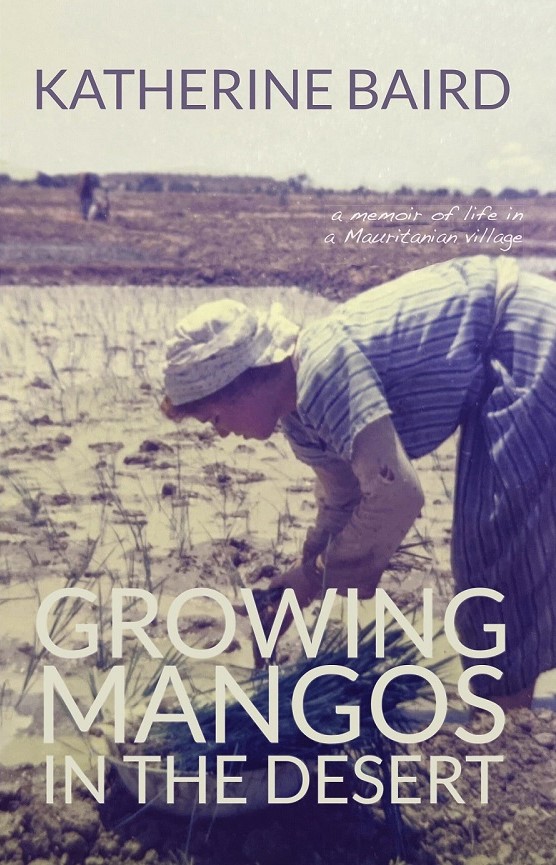Katherine Baird
Growing Mangos In the Desert

Growing Mangos in the Desert
By Katherine Baird
- Publisher: Loyola College/Apprentice House (June 5, 2022)
- Language: English
- Paperback: 398 pages
- Price: $19.99
- ISBN-10: 1627203621
- ISBN-13: 978-1627203623
Growing Mangos in the Desert in the Desert transports readers to a profoundly different culture to leave a message about human experience and the deep inequalities that mark all of our lives.
Available Where All Fine Books are Sold
Reviews
Katie Baird’s moving memoir about the people she worked with and the lessons she learned as a Peace Corps Volunteer brought me to tears. It reminded me how much our Peace Corps experiences made us citizens of the world.
— Donna Shalala, former Health and Human Services Secretary, former member of Congress, RPCV Iran 62-64
A truly remarkable young American finds herself in the early 1980s living for two years in an Islamic community on the Senegal River in West Africa. She is there to transmit modern rice growing techniques, about which she knows next to nothing. Baird is a spellbinding storyteller about those who she came to love and also about her own poignant, joyful, hilarious, and awkward moments there, and about how she learned more than she taught. Her globalization of the heart is an inspiring antidote to polarization and parochialism.
— Samuel Bowles, Santa Fe Institute, and author of The Moral Economy
Katie Baird’s story would have been gripping enough on plot alone, but add to that her lyrical, beautifully-crafted prose and her deeply-attuned ability to report what she learns in a and her deeply-attuned ability to report what she learns in a fascinating country, makes Growing Mangos in the Desert a memoir not to be missed.
— Rachael Herron, bestselling memoirist
A delightfully engaging story of misunderstandings and mishaps, achievements and disappointments, discoveries and connections, in a fascinating country that few English-language readers will know anything about at all.
— Don Kulick, author of A Death in the Rainforest: how a language and a way of life came to an end in Papua New Guinea
A West African village gains universal relevance in Katie Baird’s moving account. At the heart of this book is the story of an extraordinary collaboration — one that begins in mutual wariness but develops into a testament to persistence in the face of adversity, and to the power of community organizing. Read it with hope and heartbreak, and finish it with a renewed sense of the possible.
— Lesley Hazleton, author of ‘After the Prophet’ and ‘The First Muslim’
Katherine Baird’s memoir describes a young woman’s adaptation to a completely foreign place, and her commitment to improving the lives of those in a Mauritanian village in theFuuta. Yet her memoir also attests to the strong friendship that developed between two people separated by age and culture. For both of these reasons it deserves to be read.
— Adama Gnokane, retired Historian, Nouakchott, Mauritania
Katie Baird’s memoir, Growing Mangos in the Desert transports readers to a land few have visited, and to a time and place that no longer exist. With humor and deep respect, she describes the impressions and experiences of an American living in the village of Civé, coming to realize that sometimes ‘the helper’ has far more to gain than the people being ‘helped’. Katie’s memoir brings new ideas, new realities, and new ways of understanding to the world around us.
— Nancy Rolock, PhD, Henry L. Zucker Associate Professor of Social Work Practice
Growing Mangos in the Desert by Katie Baird is an amazing firstperson account of young Katie’s journey to Civé, a small rural village at the very edge of Mauritania. Katie Baird takes the reader along on her spell-binding journey into a world of abject poverty that slowly reveals the rich depths of tradition and friendships that cross all boundaries of race, religion, gender, and formal education. Neither her Peace Corps training nor the other volunteers prepared her for the realities of being dropped in a society where she was barely able to communicate, and the only source of water was the river that separates Mauritania from Senegal—a river that turned into stagnant pools separated by foul-smelling sludge in the equatorial heat of summer. Katie’s meteoric growth as she assimilates into the village and the mounting tension as she and the village chief navigate the mine fields of politics and the red tape of aid organizations is as exciting as that of a well-planned thriller—and even more heart stopping because it’s all real.
— Dixiane Hallaj, author of Breakfast in Palestine
